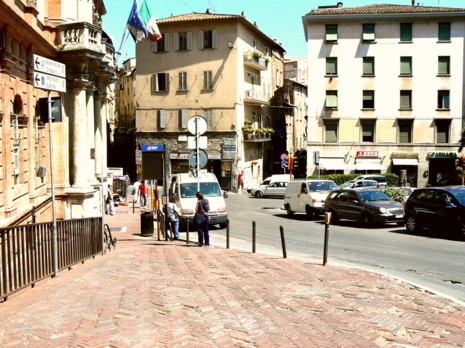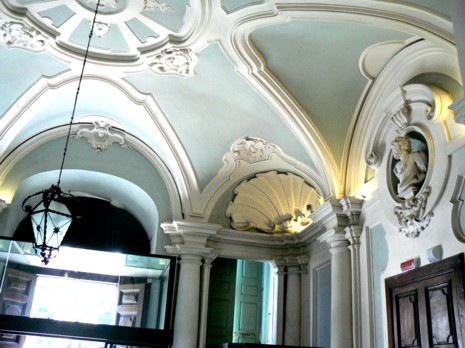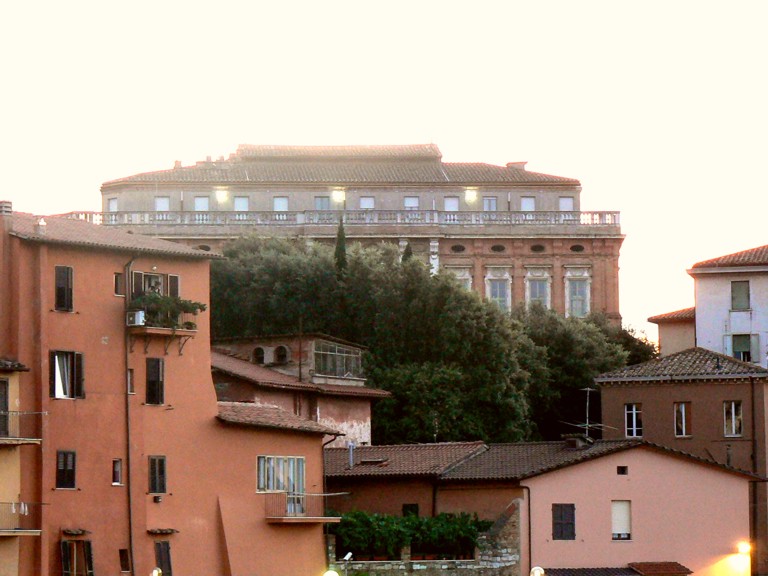
Headsup: To those many lawyers amazed that Knox did not get on the witness stand to head off a certain re-conviction: the best guess among Italian lawyers is that Knox's own lawyers feared ANOTHER calunnia charge if she repeated the crackpot and highly disprovable claims that she was tortured. The tough calunnia law is primarily a pushback measure against mafia meddling which is widely suspected in this case.
Saturday, February 28, 2009
Trial: Nick Squires Reports On The Saturday Morning Testimony
Posted by Peter Quennell
Overview
This below is part of the testimony this morning from the crime scene investigators. Click above for the full story.
We will be posting a wrap-up, if possible tonight, with a lot more detail from the Italian media.
This below is part of the testimony this morning from the crime scene investigators. Click above for the full story.
Officer Chiacchiera and Officer Napoleoni
A police officer, Marco Chiacchiera, told the court that no record was found of a telephone call that Mr Sollecito claims to have received on his apartment landline at 11pm on the night of the murder, Nov 1, 2007.
The Italian IT graduate maintains he was in his flat that night but cannot remember if Miss Knox spent part or all of the night with him.
Miss Knox, a University of Washington student from Seattle, initially told investigators she was in the house when Miss Kercher was killed and covered her ears against the victim’s screams. Later, she said she was not there and claimed her earlier remarks were made under pressure from the police.
Another police officer, Monica Napoleoni, who heads Perugia’s murder squad, recalled discovering Miss Kercher’s body, semi-naked and partially covered by a duvet, in her bedroom.
The British student’s eyes were open, she said, and her blood-soaked bra was on the ground near her feet.
Ms Napoleoni recalled thinking that Miss Knox and her boyfriend seemed “indifferent to everything” when they were called to a police station in Perugia for questioning on Nov 5, 2007. It was there that the American turned cartwheels and did the splits.
Amanda Knox’s father is reported as responding that she was a yoga enthusiast, and it was not unusual for her to break into a yoga pose in the middle of conversations.
Trial: Andrea Vogt Reports More Of The Details Introduced Friday
Posted by Peter Quennell
Introduction
Click above for the full report. From Andrea Vogt, a highly objective reporter, one of only two or three Italian-speaking American reporters actually attending the trial.
1) Knox at the police stationz: Officer Profazio and Officer Napoleoni
Giacinto Profazio, who supervised the investigation, said he had to tell the suspects at one point [at the police station] that it was inappropriate for Knox to sit on Raffaele Sollecito’s lap.
The couple was kissing, making faces and acting increasingly annoyed at investigators’ questions, said Monica Napoleoni, the head of Perugia’s homicide squad… “I took particular notice of their behavior because it seemed impossible that these two kids were there kissing when the cadaver of their friend had just been found,” Napoleoni said.
Police also emphatically defended their handling of the Meredith Kercher murder investigation, refuting allegations that Knox and Sollecito were mistreated during questioning in November 2007.
Investigators were firm, she testified during the six-week-old murder trial, but “absolutely” did not use violence—a claim Knox has made.
“She was given a drink more than once,” Napoleoni said. “She was given a hot chamomile tea; she was offered breakfast. Amanda was treated well.”...
2) And at Meredith’s house and Sollecito’s apartment: Officer Napoleoni and Officer Chiacchiera
Police and defense lawyers clashed over key forensic points, including whether or not the crime scene was contaminated, how the murder weapon was identified, luminol-enhanced footprints compatible with those of Knox and Sollecito, Knox and Kercher’s blood found in the bathroom, and most contentiously, Kercher’s bra clasp with Sollecito’s DNA on it.
Both Napoleoni and Marco Chiacchiera, the first investigating officer to arrive, said the crime scene didn’t jibe with the lone burglar theory put forth by the suspects. For example, the room had been messed up before the window had been broken, Chiacchiera said.
The 10-pound rock found inside the room would have been difficult to throw from the ground, more than 10 feet below, he said.
“The fact that this girl was semi-nude with a wound of that type, in a pool of blood in her own room with the door locked, and then with the rock and window like that—well, progressively, the analysis of all the investigative elements made us suspicious,” Chiacchiera said.
Investigators’ suspicions deepened once phone records arrived, he said, because there was a void of calls from 8:30 in the evening until the next morning on both their phones. In months prior, records showed phone activity until late in the night. In addition, Sollecito had told police his father had called him at 11 p.m., but phone records showed no such call….
Even the smallest details became points of [defense] contention, such as why investigators took into evidence the Manga comics Sollecito kept near his bed, which Chiacchiera described as “a cross between pornography and horror,” but took no notice of a nearby Harry Potter novel.
Friday, February 27, 2009
Trial: Lot Of Evidence Introduced In First Pass In Afternoon Session
Posted by Peter Quennell
This was testimony from the crime-scene investigators who searched Meredith’s and Sollecito’s apartments on the day after the crime.
The UK press and the Associated Press (the main source for reports in American media) have not yet updated their stories beyond those linked-to below.
But the Italian press is reporting testimony from the officers who found the knife in Sollecito’s apartment which may have Knox’s and Meredith’s DNA on it (see Nicki’s post Monday on the knife and other DNA below).
Also there was testimony on the phone records which seems to indicate Knox’s and Sollecito’s mobile phones were turned off almost together around mid-evening on the night of the murder. There is a record of Sollecito’s being turned on again at daybreak the next morning, but apparently no record of when Knox’s phone was turned back on.
Also introduced this afternoon was the first of the testimony on the finding of Meredith on the floor of her bedroom (see Brian’s post Wednesday on this sad and apparently very telling scene).
There was crime-scene-officer testimony also on the finding of the large rock in Filomena’s bedroom. The defenses are reported to have put on a spirited show here, and to have again argued the possibility that an intruder could have got in via Filomena’s window.
Crime scene officers testified that a ready-made much-easier break-in route existed, by way of the balcony and the windows and balcony door out back.
On Sunday, our poster Kermit will be putting up new Powerpoints showing why this route is so viable. And again but even more-so how absurd Filomena’s window looks as a preferred point-of-entry.
Trial: Nick Pisa Of On-The-Ball Sky News Reports Early Testimony
Posted by Peter Quennell
Hmmm. Many officers testifying = weakness of the case? That seems a stretch.
And in the accompanying article on Sky News, Nick Pisa reports one officer’s testimony.
Mr Profazio, who now leads the narcotics division in Rome, told the court how he had been on holiday at the time of the murder, but immediately returned to work.
“I was away when I had a phone call from colleagues telling me that there had been a terrible murder. The body of an English girl had been found with her throat cut,” he said.
“I immediately headed back to Perugia and got to the scene at the same time as the forensic officers from Rome.
“A window was pointed out to me, which was broken and which was said to have been the point of entry, but I thought it was strange as it would have needed a superhuman effort to climb up to it.
“I noticed that there was a much easier way into the house at the back, via a terrace and a boiler, there was a chair and table on the terrace and it would have been a lot easier to get in this way.”
He also told the court how both Knox and Sollecito’s mobile phones had been switched off “practically at the same time” between 8.00pm and 8.30pm the night of the murder.
Mr Profazio also told the court that a search of Sollecito’s house had discovered a 30cm kitchen knife which was given to forensic experts for examination.
Trial: Nick Squires Reports On The Friday Morning Session
Posted by Peter Quennell
Click above for Nick’s report. Some perhaps-overdue seriousness is now setting in, it seems.
The 21-year-old American student, in jeans and a purple cardigan, appeared more sober and downcast than on previous occasions as she was led into court in Perugia, where she and her Italian ex-boyfriend are on trial for murdering the Leeds University student.
As soon as she sat down she bowed her head and appeared to start crying, after greeting her father, Curt Knox, with a nervous smile.
She was comforted by her translator, a uniformed prison guard and one of her lawyers, who patted her gently on the back. Her demeanour was in marked contrast to previous hearings, when she smiled and joked with her lawyers.
Thursday, February 26, 2009
Cutting Through The Confusion Over Knox’s Status In Perugia
Posted by stewarthome2000
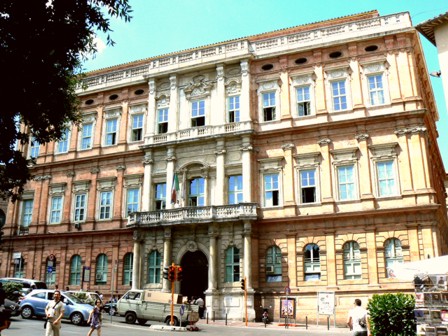
[Shots: School for Foreigners; bottom shot from above Meredith’s house]
The media have now repeated countless times that Amanda Knox was on a “study abroad program”.
In fact, as these things are defined, she was not. It is precisely that she was NOT on a study-abroad program that she was able to adopt a lifestyle that seems to have led her to where she is now.
To go on a study-abroad “program” means that you attend an organized and SUPERVISED curriculum and agenda, most often with peers, faculty and/or at the very least a local administrative staff person assigned to periodically look after the participants’ behavior and well-being.
In fact the University of Washington does not even have a study abroad “program” in Perugia. It merely suggests to UW students that the Universita per Stranieri is a possible destination and place for students to go on their own, and if asked helps out with some administration.
Knox took the “non-conformist” path to study abroad. I recall reading that she did not want to go on a program so as to not follow the group, so to speak. So she did study abroad, but cheaply, and outside an organized program by the University of Washington. She was basically in Perugia on her own.
This is characteristic of at least two type of people, those who are adventurous, exploratory and want a true full-immersion experience into the cultural side of the host country (usually Italian majors), and those who want to be untethered and to have total freedom and no one to answer to so they can do as they wish.
Her casual attitude to her studies and other strong hints in her behavior and writings suggests that she was the latter type.
And presumably her biological parents understood all of this and signed off on it, even before Amanda Knox ever left Seattle.
Parents especially should know that if Knox had attended a UW-operated or US-University run study abroad program with supervision, her attendance in class would have been monitored, and any behavior that would upset roommates may have been reported.
In these programs for the most part there are strict housing rules such as no overnight guests, let alone bringing guys home to sack up with. Most of the time roommates will complain on the spot or get back to the American administrators that they have an out-of-control roommate bringing guys home, drinking excessively, or doing drugs.
In addition, programs with the proper supervision have enough of a presence to let the participants know that someone is at least checking up now and again. And as a result they watch their behavior.
Furthermore, in well-run programs, students are given significant preparation about living in the specific host country and city with pre-departure materials and perhaps meetings, talking with ex-participants, and attending an extensive multi-day orientation where staff and even local police lecture them about the many pitfalls of living in a foreign and new environment away from home.
They are reminded that the laws are different in other countries, and more importantly that there are some bad people walking the streets. They are told to enjoy themselves and learn, but also to be careful, stay alert, stay out of trouble, and so on.
I myself work in study abroad and we know what unleashed unsupervised colleges students get themselves into. We are trained to look for potential problems and we visit all students accommodations at least once per month and speak with everyone there.
We have open-door counseling and professionals with years of experience on staff. We watch out for all our students regularly… we know what behavior to look for, and when to intervene, at least most of the time.
Yes, it costs more to attend the Universita per Stranieri or any overseas university through a US-college or US-university monitored program with local on-site staff and supervision.
But the situation Amanda has created, or at least found herself in, is much less likely to happen to students on a supervised and accredited study abroad program.
Let’s face it, at the age of 20, 21, or 22, many young adults are still really more or less kids. Naive and vulnerable, especially those who have yet to explore their “wild side”, they sometimes see this as an opportunity to make up for lost time.
This is exemplified in the fact that many pass out from drinking in the days after they arrive. Bottom line, they need guidance, and no more so than when they are 8000 miles from home and on their own.
Knox took the “I am too good to go on study abroad program with fellow students” route and the cheapest way overseas. And it is not proving so cheap anymore.
Her biological parents really should have known better. All parents should either make sure the students are mature enough, or make sure they have a structured environment that can assist them while abroad. It is well worth the extra cost and peace of mind.
So the media should please get this straight from now on.
- Amanda Knox was NOT on a study abroad “program” while in Perugia. She was at most “studying abroad” as that term is used very loosely.
- She took a leave from the University of Washington to study Italian at what is essentially a glorified language school which anyone can attend.
- She was totally unsupervised in a high-risk situation where it would have seemed obvious to any supervisor that she was looking to break away.
- And she most likely would have had a very difficult time getting any credit for her studies from the University of Washington at the conclusion.
So. The worst possible deal for any student abroad. The parents signed off in advance. It seems to have exploded on Knox. And poor Meredith died.
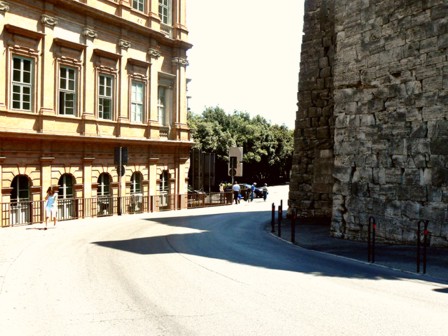
Wednesday, February 25, 2009
Understanding Micheli #4: The Faked Crime Scene - Who Returned To Move Meredith?
Posted by Brian S
Here now is the full 2011 Micheli Report kindly translated by Catnip for the Wiki and TJMK.
1. Where We Stand
Just to recap. Judge Micheli presided over Rudy Guede’s trial and sentencing and the final hearing that committed Raffaele Sollecito and Amanda Knox to trial.
Late January he made public the 106-page report that explains the thinking behind both actions. These posts are examining key areas of the report so that we too may decide on the rationales.
2. The Final Position Of The Body
Why this matters so much is that if the evidence holds firm, all by itself it will prove that there was a major rearrangement of the crime scene, to try to throw investigators off the trail.
This is as near to an 80,000 pound gorilla in the room as we are likely to see in this trial. And it may even be on the trial agenda for this coming Friday and Saturday.
Reports by the crime-scene investigators and Dr Lalli are summarised in Judge Micheli’s report. They describe the detail of the scene discovered in Meredith’s room. The investigators measured and photographed the position and state of everything, including blood, as it was in the room before anything was moved.
Amongst the items noted was a white bra. Some parts were soaked in blood, particularly the right shoulder strap and the outside of the left cup. They also noted that a portion of the backstrap with its clasp fixings was missing. Meredith herself was lying on her back midway between the wardrobe and the bed, without her jeans, a pillow under her buttocks and her top rolled up to reveal her chest.
Following this survey, Meredith’s body was then turned and moved by the investigators. This revealed the other items on which her body had lain. A tennis shoe, a white sheet from the bed and a blue zipped top, all with blood stains. Also a green bath towel and an ivory bath towel, both soaked in blood, and underneath the pillow was the missing clasp section of the bra back-strap.
Judge Micheli notes that Amanda’s defence claimed that “the small round spots of blood” apparent on Meredith’s chest indicated that she was not wearing her bra when she was killed. He agreed that it was likely that these spots fell from Meredith’s gasps for breath as she lay on her back after she had been stabbed. However, he could not agree with their conclusion that her bra had been removed before this time, as similar small round spots were also found on Meredith’s bra.
Micheli reasoned that this indicated that Meredith was still wearing her bra as she gasped for breath, but that her top was rolled up and the bra moved also. Thus indicating the sexual nature of the original attack, but also allowing the small round spots to fall on both chest and bra. Furthermore, other blood evidence involving the bra indicated that it wasn’t removed until some time after Meredith had died.
He said that Meredith’s bra was found by investigators away from other possible blood contamination on the floor, near to her feet. Photographs of Meredith’s body show clear white areas where the bra prevented blood from falling onto Merediths body. These white areas corresponded to those areas where blood was found on her bra. This was particularly true in the area of the right shoulder strap which was soaked from the wound to Meredith’s neck.
Micheli said that evidence showed that Meredith had lain on one shoulder near the wardrobe. She lay in that position long enough for the imprint of her shoulder and bra strap to remain fixed in the pool of blood after she was moved to the position in which her body was finally found. Photographs of blood on her shoulder matched the imprint by the wardrobe and her shoulder itself also showed signs that she had remained in that position for some time.
Based on all this, Judge Micheli concluded that there could be no doubt that Meredith’s body was moved away from the wardrobe and her bra removed quite some time after her death.
Neighbor Nara Capezzali had testified that people fled from the cottage within a minute of Meredith’s final scream. There was no time for any alteration of the crime scene in those very few moments.
Judge Micheli asks in his report, who could have returned later and faked the scene which was found? Who later moved Meredith’s body and cut off her bra? He reasons it could only be someone who had an interest in changing what would become a crime scene found at the cottage. Who else but someone who lived there, and who wanted to mislead the coming investigation?
It couldn’t have been Laura, she was in Rome. It couldn’t have been Filomena, she was staying with her boyfriend. It was very unlikely that it was Rudy Guede, all proofs of his presence were left untouched.
The culprits ran from the cottage in different directions and there is no reason to believe they met up again before some or one of them returned. Judge Micheli stated that, in his opinion, this just left Knox who would seem to have an interest in arranging the scene the police would find.
Bloody footprints made visible with luminol in Filomena’s room contain Meredith’s DNA. This indicated to Judge Micheli that the scene in Filomena’s room was also faked after Meredith was killed.
In Micheli’s opinion the scene in Meredith’s room was probably faked to point the finger at Rudy Guede. All evidence related to him was left untouched, and the pillow with a partial palm print was found under Meredith’s repositioned body.
But whoever later arranged that scene in Meredith’s room also unwittingly indicated their own presence at the original sexual assault. Who else could have known that by staging an obvious rape scene, they would inevitably point the investigators towards Rudy’s DNA which they knew could be found in Meredith?
Micheli asks: Seemingly, who else could it have been but Amanda Knox? And this in part is why she was committed to trial, for her defense to contend this evidence.
Monday, February 23, 2009
Understanding Micheli #3: Precisely How Damning Is The DNA Evidence?
Posted by Nicki
Here now is the full 2011 Micheli Report kindly translated by Catnip for the Wiki and TJMK.
1. The Context
Judge Micheli has had two very important roles. He presided over Rudy Guede’s trial and sentencing, and he presided over the final hearing that committed Raffaele Sollecito and Amanda Knox to trial.
Late January, Judge Micheli made public the 106-page report that explains the thinking behind both actions.
These four posts are examining several very key areas of the report so that we too may choose whether to buy into the rationales. I recommend watching this Powerpoint.
Click for Post: Powerpoints #7: DNA Evidence - A Very Clear Intro To A Vital Subject Here
2. The DNA Evidence
Coming up soon is a more silent witness, one very important to both the prosecution and the two defenses: the extensive DNA evidence.
Specifically the DNA belonging to Meredith, Knox, Sollecito, and Guede, which was found at the scene of the crime, and on the suspected murder weapon found, apparently hidden, in Raffaele Sollecito’s house.
DNA of Sollecito has been found on the clasp of the victim’s bra. DNA of Amanda Knox was identified on the knife handle and also in the bathroom and Filomena’s room. DNA of Meredith DNA has been found on a knife compatible with the wounds that caused her death. DNA of Guede was found on the victim’s body and items and elsewhere in the house.
In summary, the biological sources and locations where DNA belonging to the victim and three defendants was found are these:
Guede’s DNA
DNA (from epithelial cells) was found inside Meredith, also on toilet paper, also on the right side of Meredith’s bra, also mixed with Meredith’s DNA on the her purse zip, and also on the left cuff of Meredith’s light blue sweater. Five total.
Sollecito’s DNA
DNA (from epithelial cells) was found on Meredith’s bra clasp, mixed with Meredith’s DNA, and also on one cigarette butt found in the kitchen. Two total.
Knox’s DNA
DNA (from epithelial cells) was found on the knife handle, and also close to the blade junction. DNA was also found in the small bathroom and in Filomena’s room
Meredith’s DNA
DNA was found on the knife blade. It was not possible to ascertain both the haematic and epithelial source of Meredith’s DNA on the knife blade, due to the scarcity of the sample. Numerous significant biological traces belonging to Meredith were found outside her bedroom - for example, DNA originating from the blood-trace footprints revealed by luminol found in Filomena’s bedroom, as reported at the Massei trial. Many instances total.
3. Defence Claims
Claims of contamination and “poor matches” of the DNA samples were raised by the Sollecito and Knox defenses, although not by Guede’s.
These claims had not been raised by the defenses’ experts who observed all the testing.
4. Prosecution Rebuttal
The DNA expert Dr. Stefanoni’s arguments in reply to the defenses’ claims are summarized in Judge Micheli’s report.
Low Copy Number
Dr Stefanoni reported that the locus ascribable to Meredith and identified on the knife blade shows readings of 41 and 28 RFU.
Conventionally, RFU values lower than 50 can be defined as low. But she maintained that the profile matched Meredith’s by explaining that there is no immediate correlation between the height of the peaks obtained by electropherogram and expressed in RFU, and the reliability of the biological investigation.
In fact even if statistically - in most cases - the RFU data is directly proportional to the possibility of a certain interpretation of the analysis result, on the other side many cases of high peaks of difficult interpretation exist (because of background noises), as well as low peaks that are objectively unquestionable, hence the need to proceed to the examination of data that is apparently scarce, but that mustn’t be considered unreliable per se.
The use of multiplex PCR and fluorescent dye technology in the automated detection and analysis of short tandem repeat [STR] loci provides not only qualitative information about the profile - i.e. which alleles are present - but can provide also quantitative information on the relative intensities of the bands, and is therefore a measure of the amount of amplified DNA.
So if on one side Dr Stefanoni admits that the RFU readings are low, on the other her experience suggests that many cases of unquestionable matches exist showing readings lower than 50 RFU, and this appears to be the case with Meredith’s DNA sample on the knife.
Possibility Of Contamination
Contamination in the laboratory is categorically excluded by Dr Stefanoni. The samples were processed with maximum care in order to avoid any contamination during lab procedures. Defense experts observed all processing and nevr raised any objection.
Contamination during the collection phase is excluded by Judge Micheli, as the samples were collected by different officers at different times in different places (example Via della Pergola at 9:40am on Nov 6. 2007, and Sollecito’s apartment at 10:00am, on the same day, by a different ILE team).
As for Sollecito’s DNA found on the bra clasp, the match is unquestionable, according to the lab reports.
Samples from crime scenes very often contain genetic material from more than one person (e.g. Rudy Guede’s DNA has been identified in a mixture with the victim’s DNA in a few places), and well-known recommendations and protocols exist in order to de-convolute mixed samples into single genetic profiles.
So if the lab reports indicate that unquestionable biological evidence of Sollecito’s DNA was found on the bra clasp, at the present time we have no reason to believe that these recommendations weren’t followed and that therefore the reports are not to be trusted.
Conspiracy Theories
As to cells “flying around” depositing themselves - and their DNA content - here and there around the murder scene, there have been some imaginative theories advanced, to say the least.
The reality though is that although epithelial cells do shed, they don’t sprout little wings to flock to one precise spot, nor grow feet to crawl and concentrate on a piece of evidence.
There needs to be some kind of pressure on a surface in order to deposit the amount of biological material necessary to yield a reliable PCR analysis result.
A simple brushing will not do.
As a matter of fact, Dr Stefanoni agreed with Guede’s defense that Guede’s genetic material found on the left sleeve of Meredith’s blouse was minimal; and this was because the DNA found there belonged to the victim and was not a mixture.
In the situation where there is a clear disproportion between quantitative data of two DNA’s coexisting in a biological trace, the PCR will amplify the most abundant DNA.
As agreed by Dr. Stefanoni and Guede’s defense, the conclusion here was that on the left sleeve there was plenty of Meredith’s DNA; but very little of Guede’s. This was used by his defense to deny that Guede had exerted violence on Meredith’s wrist.
5. Judge Micheli’s Ruling
After listening to the arguments of the prosecution and the defenses, Judge Micheli provided reasons why he rejected the contamination claims and ruled that all the biological traces identified as reflecting Sollecito’s and Knox’s DNA are admissible as evidence.
He arrived at the conclusion that the DNA evidence is sound and, considered along with the non-biological proof, he decided there was more than enough evidence to order Knox and Sollecito to stand trial.
6. Relevance To 2009 Trial
Regarding the biological significance of the traces, we are now looking forward to hearing the Knox and Sollecito defenses’ counter-arguments. But as we understand it now, the DNA evidence for the trio having all been involved in the murder seems pretty damning.
The trial to establish the truth about the murder of Meredith continues next Friday. As we’ve reported, various human witnesses have already been heard from: the Postal Police who discovered Meredith’s body, Meredith’s two Italian roommates, and her seven British friends.
Friday, February 20, 2009
Daily Mail’s Jan Moir Wants Due Process Respected By Parents
Posted by Peter Quennell
Click above for influential Jan Moir’s full column.
It is mainly about UK cases of parents not respecting the process, but the Knox campaign also gets a mention.
When Amanda Knox was arrested in Italy in connection with the murder of Meredith Kercher, her family began an incantation of her innocence and a blaring defence of her character that continues to this day
The defense PR campaign here seems to be unique in recent United States legal history. Also TV networks paying out very big bucks for exclusives with defendants’ relatives, as was just reported about ABC, seems something of a first here.
Typically the situation is that it is the victim and their relatives who get all the attention. Often on steroids. So it’s perhaps not surprising that Jan Moir is surprised.
The name of the victim here is Meredith, of course.
Thursday, February 19, 2009
Trial: A Heavyweight American News-Site Reports Well On The Case
Posted by Peter Quennell
Click above for the report in Tina Brown’s new Daily Beast
The Beast is an innovative and very-fast-growing New-York based site (like our own!) which launched about the same time we did (no connection).
We see this piece is by the same Rome-based American reporter who filed the Newsweek report below. There are only three or four American reporters close to this case, so it seems they’re in real demand now.
Less than we would have liked on Meredith. Almost no mention. But there are points here of special interest:
1) Knox seems to be enjoying the assigned role
Sollecito comes in shortly after, but most people remain fixated on Knox, who does not look at all like the girl in TV footage taken the day after the crime, cuddling with Sollecito. She is older, thinner, and much prettier, and she has an aura about her. She looks comfortable in the courtroom, almost as if she is playing a role rather than facing charges of cutting Meredith’s throat while Sollecito held back her arms and Guede sexually assaulted her.
2) Sollecito has a new journalism career
Sollecito, who comes from a wealthy and connected family in Puglia, in the south of Italy, has been recruited to write a regular column from prison for his hometown paper in Bari. In it he recently claimed that he was a 23-year-old virgin when he met Knox. Interest in Sollecito has not been as ardent as that lavished on the pretty American coed, but it is growing.
3) The aggressive PR campaign is discouraging digging
An aggressive PR machine out of Seattle that runs under the moniker “Friends of Amanda” speaks out quickly and authoritatively in Knox’s defense, effectively discouraging US media from digging deeper into this mysterious crime. Family spokesman David Marriott arranges regular TV appearances for Knox’s parents and confirmed in an email that ABC’s 20/20 “paid for [Amanda’s mother] Edda to travel to Perugia and back. As a result, the family feels obligated to speak with ABC first.”
We hear other rumors of American networks paying big bucks for the attention of the biological parents. No-one, of course, is paying the Kerchers anything at all - they apparently insist on paying all their own bills.
4) TJMK and Perugia Murder File get highlighted
Meanwhile, the case has taken on a bizarre life of its own in the blogosphere, where a number of partisan websites, in both English and Italian, wage fierce battle. Among the most notable are the New York-based True Justice for Meredith Kercher and the Perugia Murder File, which both believe that Knox is guilty and defend the court proceedings in Perugia, translating critical court documents and creating impressive Powerpoint presentations to help readers decipher the evidence.
Hmmm. Vey nice, but a correction, if we may, Beast? These sites don’t ever claim guilt. They point to very hard evidence to address, and a very fair process under way. And to the once-fading-fast notion that justice for Meredith, the only real victim here, really matters.
The impressive Powerpoints created for us by Kermit and Nicki (with more to come) are all here. And why the defendants were sent to trial can be read here.
5) The fratricide on some amateur websites now in meltdown
The blogs in defense of Knox include Italian Woman at the Table, which is run by a Seattle-based reporter writing a book on the case, and Perugia Shock. Comment sections in the blogs are rife with threats and accusations””not against Knox and Sollecito, mind you, but against other bloggers. Some have taken to exposing the actual names and addresses of people posting under screen names or threatening physical harm to those with opposing views of the case.
6) And how the case coverage is tracked in Perugia
The blogs are taken very seriously in Perugia, where prosecutors have assigned someone to follow the postings.
So how is it going there, guys? Getting paid to read us? That must be a first…





